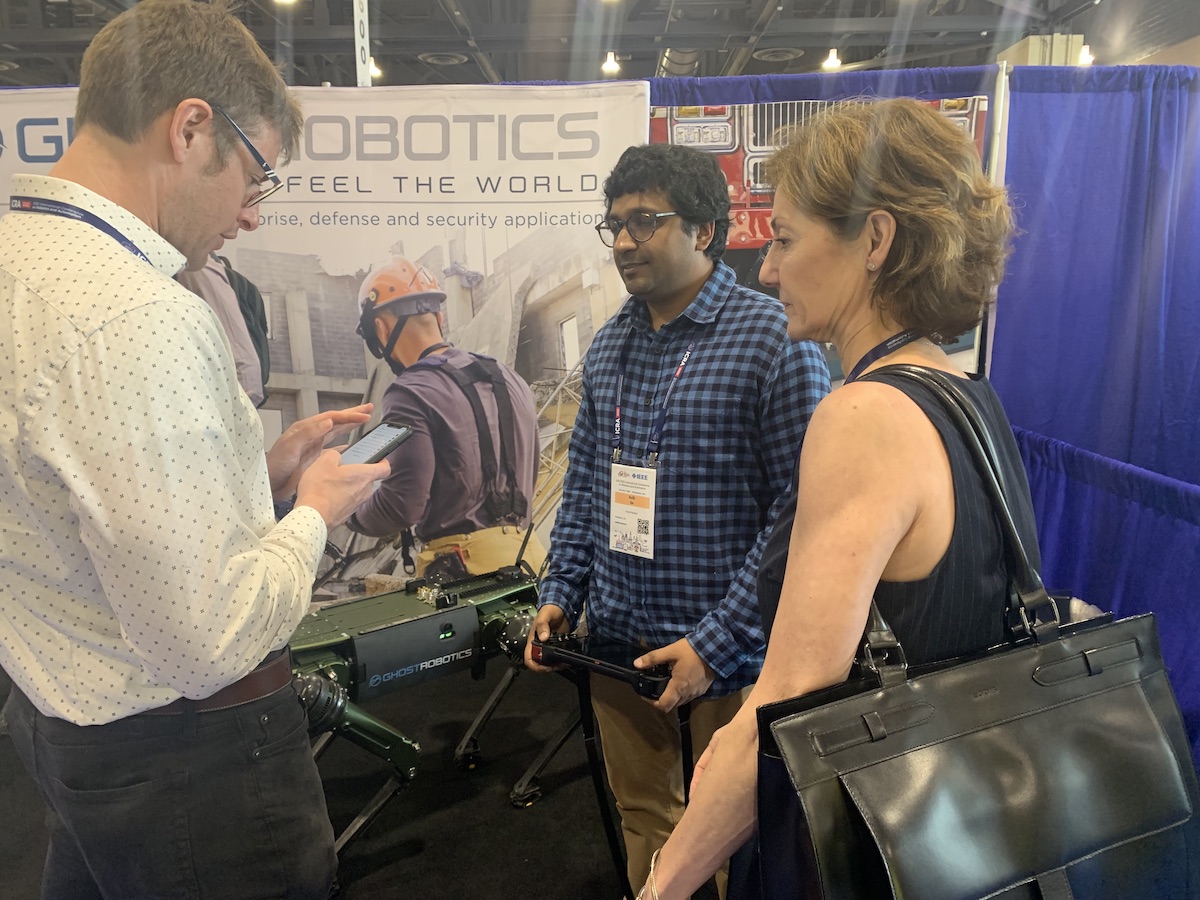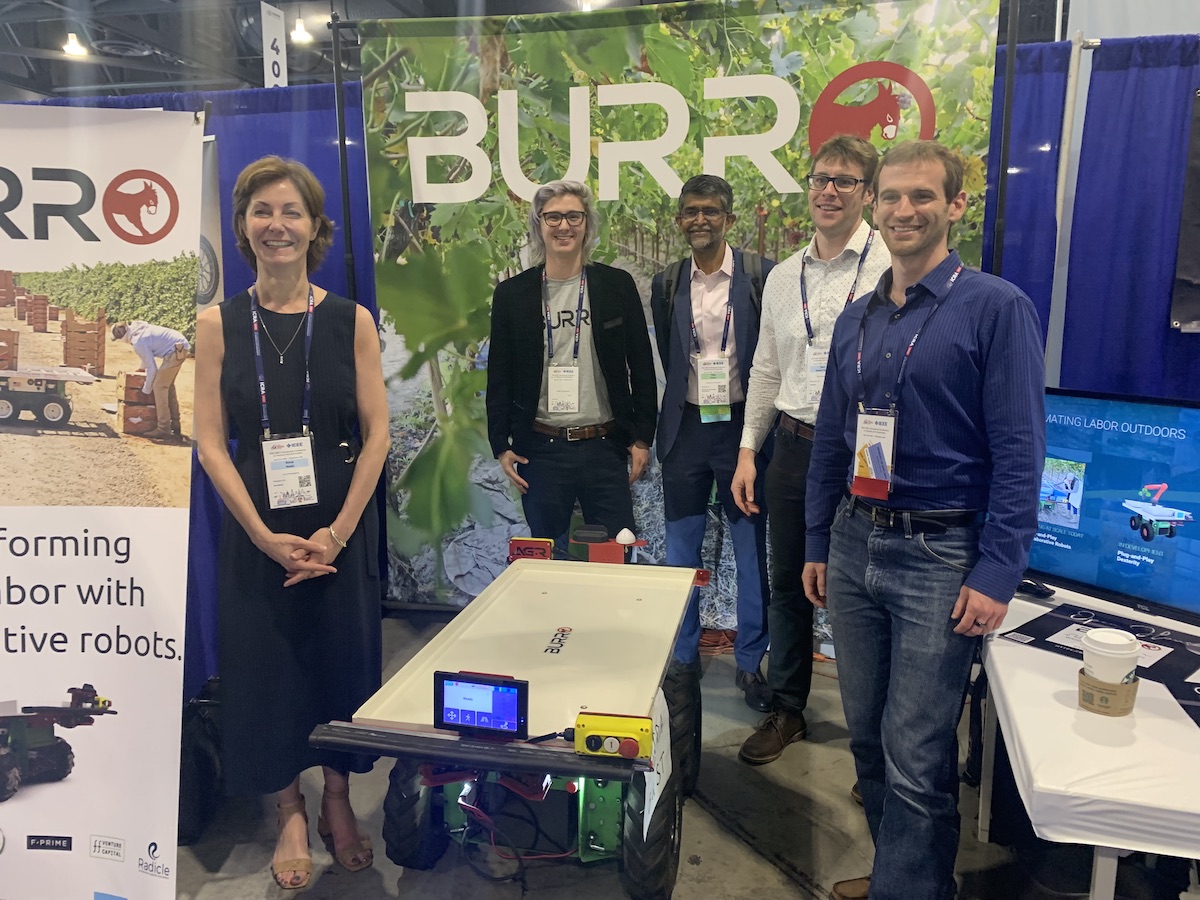On the third day of the International Conference on Robotics and Automation, I found myself zipping between drones, autonomous robots and a Tesla Model S to keep up with Vijay Kumar, the University of Pennsylvania’s dean of engineering.
The university had put together a tour of sorts for Anne Nadol, the City of Philadelphia’s new commerce director who’d come to the department in March after leaving a top position at Temple University last summer. Her goal, she told me, was to meet as many Philly-based companies and do anything — really, anything — to get them to stay.
Case in point: During a quick stop at Ghost Robotics’ exhibit booth, we heard from cofounder Avik De that the city’s been good to the team so far, but that they’re currently splitting offices between the Pennovation Center and the Navy Yard because they need unique space to develop and test products. Nadol and fellow commerce department staffer Sam Woods Thomas began whipping out business cards.
“We’ve got to have something better suited for you,” Nadol told the team.
“Or we know someone who does,” Thomas added.
And then we were off again.

Department of Commerce’s Sam Woods Thomas and Anne Nadol talking to Ghost Robotics’ Avik De. (Photo by Paige Gross)
The group of us — Nadol, Thomas (the Department of Commerce’s business attraction and development director), Penn communications pros Evan Lerner and Penn Center for Innovation exec Laurie Actman— followed Kumar through the crowded rows of the expo hall at the Pennsylvania Convention Center. Kumar would stop and quickly shake hands with about every fifth person walking by, and glance back with a wave to make sure we were following behind as he snaked through the next row to introduce us to another Penn spinout.
“He’s sort of like the mayor of the conference, isn’t he?” Actman said to me as an aside.
.@AugeanRobotics’s Logan Danek explains the company’s Burro robot’s main functions during #ICRA2022 pic.twitter.com/xwgYCD3vyG
— Paige Gross ✨ (@By_paigegross) May 26, 2022
Later, when we sat down to talk about keeping hardtech startups in Philadelphia, Kumar confirmed those suspicions: He’s attended every ICRA conference since 1986, only missing in 2001, for the birth of his second daughter. This year, he co-organized the conference for a second time, willing the thousands of robotics professionals around the world to gather here in Philadelphia. The conference is about triple the size as it was in 2019, Kumar said, with more than 90 exhibitors, five days of programming and about 7,000 attendees over the week.
“I co-organized it in Anchorage in 2010, and I swore I would never do it again,” he said. “But this year, I felt Philly needed a shot in the arm.”
The last time the conference happened, it was held in Montreal, and next year it’ll be in London. Philly doesn’t get the robotics cred as many other cities do, but it doesn’t mean a robotics company can’t grow here, he said.
So how do we boost its reputation in the field?
The short answer is by growing and retaining the talent. That practice has shaped other cities, Kumar said, like Atlanta, which gets much of its workforce from institutions like Georgia Tech. Philadelphia has the institutions — robotics talent is coming out of Penn, Temple, Drexel University, University of Delaware and even Princeton University — but the city needs to continue improving its retention rates. Something like 5% of STEM grads used to stay in the Philadelphia region upon graduation, but it’s increasing to 20 to 30%, he said.
And although Philly’s STEM ecosystem is evolving — peep its ever-growing life sciences sector — it’s not yet competing as a hardtech hub, Kumar said.
“It’s known for eds and meds, but I find in the 21st century, if you want to be described as a progressive area, which we’d like to think that we are, you need to add to that complexity,” Kumar said. “We need to bring the know-how and the ecosystem. We have a supply of talent, but we need an ecosystem that retains talent. We need to do both, have more talent and build on the feedback loop.”
Did I really go to #ICRA2022 if I didn’t watch autonomous vehicles race themselves? pic.twitter.com/6pTpli2eK2
— Paige Gross ✨ (@By_paigegross) May 26, 2022
Before stopping to watch autonomous vehicles race each other at the F1 Tenth Autonomous Racing Competition, we visit Philly’s GIS-mapping drone company Exyn Technologies, electronic motor startup IQ Motion Control, IoT agriculture startup IoT4Ag and forestry mapping startup Treeswift.
“The potential is huge here,” Nadol said before running to another engagement. “They’re here and they’re growing and we want to keep it that way.”
Join our growing Slack community
Join 5,000 tech professionals and entrepreneurs in our community Slack today!
Donate to the Journalism Fund
Your support powers our independent journalism. Unlike most business-media outlets, we don’t have a paywall. Instead, we count on your personal and organizational contributions.

National AI safety group and CHIPS for America at risk with latest Trump administration firings

Immigration-focused AI chatbot wins $2,500 from Temple University to go from idea to action

The good news hiding in Philly’s 2024 venture capital slowdown


